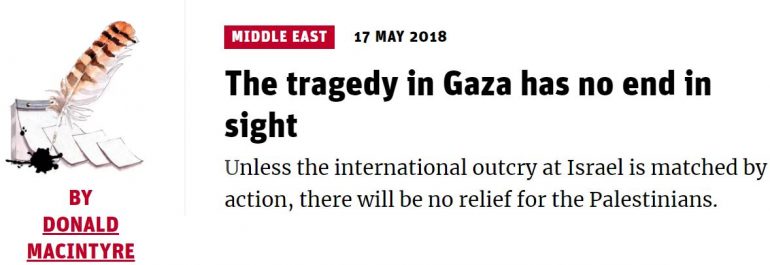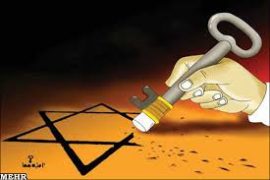Written by Aron White
Donald Macintyre is a veteran journalist, with years of experience covering the Middle East, and the Israeli-Palestinian conflict. He has published extensively for the Guardian, Independent and New Statesman, and is also the author of a book “Gaza: Preparing for Dawn.” His stature as a leading journalist makes his recent coverage of the Gaza protests – containing open falsehoods and distortions, and a fawning affection for Hamas – all the more shocking.
In an article in the New Statesman, Macintyre opens by stressing the peaceful nature of the protests, saying the deaths of Palestinians mark “a bloody climax to two months of unarmed protests,” but in a later paragraph, further clarifies what “unarmed” means, with a sentence that is quite astounding:
“…..Hamas’s Gaza leader Yahya Sinwar, who emphasised the unarmed nature of the protests (except for stones, Molotov cocktails and flaming kites that had not at that time injured a single Israeli)….”
“An unarmed protest, except for stones, Molotov cocktails and flaming kites.” This sentence defies both logic and the dictionary; imagine any other context, conflict or conversation, where such a sentence would be considered intelligent. The question of whether the weapons of choice have injured any Israelis or not is quite irrelevant to whether the protest was armed or unarmed. By the most elementary logic, any person will recognize that a protest that contains stones, Molotov cocktails and flaming kites is quite definitely not an unarmed (non-violent) protest.
Why does Macintyre write this? I would suggest it’s rooted in a deep flaw in his reporting of the conflict, whereby he is deeply beholden to a narrative, leading him to paper over uncomfortable truths. In his worldview, Israel is a colonialist project that in its very essence is anti-Palestinian. The heavily armed and dangerous Israelis continue to cause untold pain to the weak and suffering Palestinians. In this narrative, the Israelis are immutably guilty and violent, and the Palestinians are innocent victims, to whom no agency, responsibility or blame is ever to be attributed.
What if the facts are different – for example, many Palestinians are, in fact, armed and dangerous, and he knows it? Which wins: facts about the very real Palestinian threat, or the narrative of Palestinian innocence that he and his readers so desperately want? For Macintyre, the narrative wins out: The protesters may in fact have “stones, Molotov cocktails and flaming kite,” but the narrative requires something else, so they are “unarmed.”
This policy, allowing the narrative to define the story rather than the facts, is also found in other ways in the above mentioned New Statesman article. Throughout the article, the image of the Palestinians as meek and unthreatening is reinforced. Israel is guilty of “slaughter” and should use different methods of “crowd control” to deal with the “protesters and demonstrators”. All of this paints an image of peaceful protests, much like one would see in Central London, into which the Israelis step in to mow down the innocents.
Yet Macintyre himself, in other articles, also has another set of phrases to describe Palestinians in Gaza.
In an Independent article, covering a press conference given by Yahya Sinwar, Macintyre opens with the headline “Hamas Gaza leader hints at mass breach of Israel border fence, as he compares Palestinians to “starving tiger””. In the article he quotes Sinwar saying Gaza has become a “ticking time bomb,” and “no-one knows where the tiger is heading, or what it is going to do.” He closes his article with the ominous phrase, that Gaza leaves “the image of a tiger breaking out of its cage.” At the Observer, Gazans are described by Macintyre as “having nothing to lose”.
When painting a picture of Palestinian suffering, he drives his point home by painting a dark and ominous picture of just how threatening the situation is for Israel. When Israel defends itself against those threats, the Palestinians revert back to the innocent victims. Quite simply, put the two articles together, and the dissonance become clear. One does not use “crowd control” when one is dealing with a “crouching tiger bursting out its cage”, and a “ticking time bomb”. The threat of a “mass breach of a border fence” is not conveyed in his use of the term “protesters.” When he wants to paint a picture of Palestinian suffering, they are armed and dangerous. When Israel responds to the threats, once again, his drama requires that the Palestinians are innocent, unarmed and unthreatening.
Underlying much of Macintyre’s writing, there is also empathy, even a fawning sympathy, for Hamas.
He appears to see few flaw in them; for example, he discusses Israel’s “punitive” blockade of Gaza whilst totally ignoring Hamas’ responsibility in causing the blockade (Israel blockaded Gaza in 2007 when Hamas took over, prior to that there was no blockade). He seems almost praiseworthy of Hamas’ militant activities. Their call to have Gazans storm through the border fence is “ambitious,” In the past, he has described Gaza’s smuggling tunnels as a “testament to their hard work and ingenuity.”
His affection for Hamas is captured in his Independent piece, where he encourages readers to feel empathy for Yahya Sinwar, the head of Hamas:
“When Sinwar arranged his first-ever meeting with foreign journalists since taking his position last year, he could hardly have known that his organisation would two days beforehand be branded as one of four groups President Donald Trump denounced as being supported by Iran in justifying the end to US participation in the nuclear deal with Tehran.”
There are a few points here.
The assertion itself is profoundly odd. Iran is a major backer of Hamas, (a major Hamas delegation visited Tehran just a few months ago), so it is hard to imagine Sinwar was the least bit surprised by this open fact being asserted. But more egregious is the sympathy; the head of a terrorist organisation calls a press conference, but then something happens he could never have predicted – and we are supposed to feel sorry for Sinwar. The attempt to make his readers empathise with the struggles of running a murderous, jihadist group is the evidence of a moral compass that has lost its bearings.
Macintyre is ripping up what it means to be a journalist.
Instead of reporting facts, he openly lets the narrative run over them. He appears to possess admiration and evoke sympathy for a terrorist organisation, whilst accusing the opposing army of slaughter. That he believes what he believes is upsetting – that his writing is considered enlightened, intelligent, and worthy of print is egregious.
Macintyre should be held accountable for his toxic mix of unbalanced distortions and seeming terrorist sympathy . He has a lot to answer for – but until that point, other writers should cover this complex issue, giving the British public the the professional journalism it deserves.
(Mr. McIntyre responds to the post in this comment)
(Editor’s Note: A sentence in this post was amended on June 7th to more accurately reflect Mr. McIntyre’s views on Gaza’s tunnels.)
…
Aron White has a BSc in Politics and International Relations from the University of London (Lead College: LSE), and is a graduate of the Jewish Statesmanship Center in Jerusalem. His writings have been published at the Jerusalem Post, JNS, The Daily Caller and the Algemeiner.
Related Articles
- Here’s why the media got the Gaza violence wrong (CAMERA)
- Guardian’s Donald Macintyre calls for a boycott of Israeli settlements (UK Media Watch)
- Examining UNHRC statements uncritically amplified by BBC News (BBC Watch)





